2025年牛津译林版中考动词及动词短语辨析
文档属性
| 名称 | 2025年牛津译林版中考动词及动词短语辨析 |
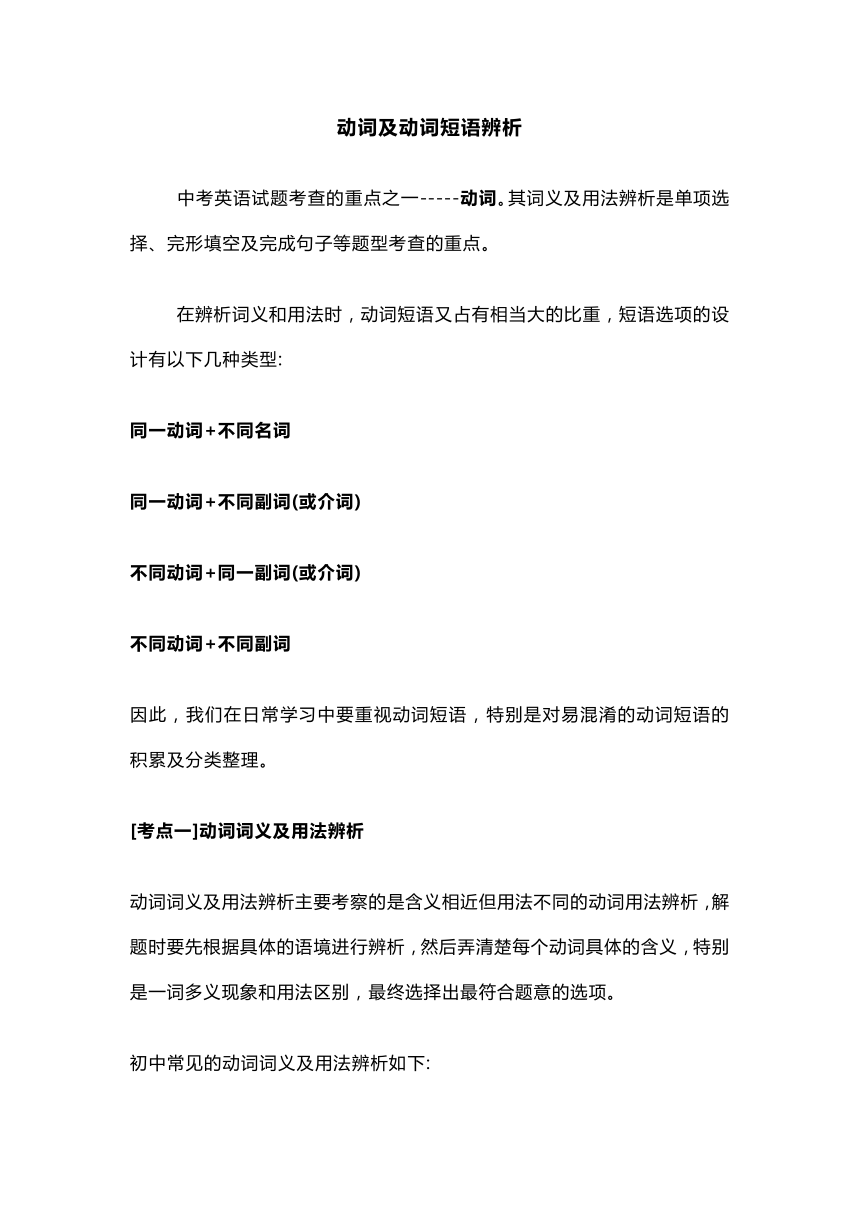
|
|
| 格式 | doc | ||
| 文件大小 | 136.5KB | ||
| 资源类型 | 教案 | ||
| 版本资源 | 牛津译林版 | ||
| 科目 | 英语 | ||
| 更新时间 | 2024-08-09 16:28:09 | ||
图片预览

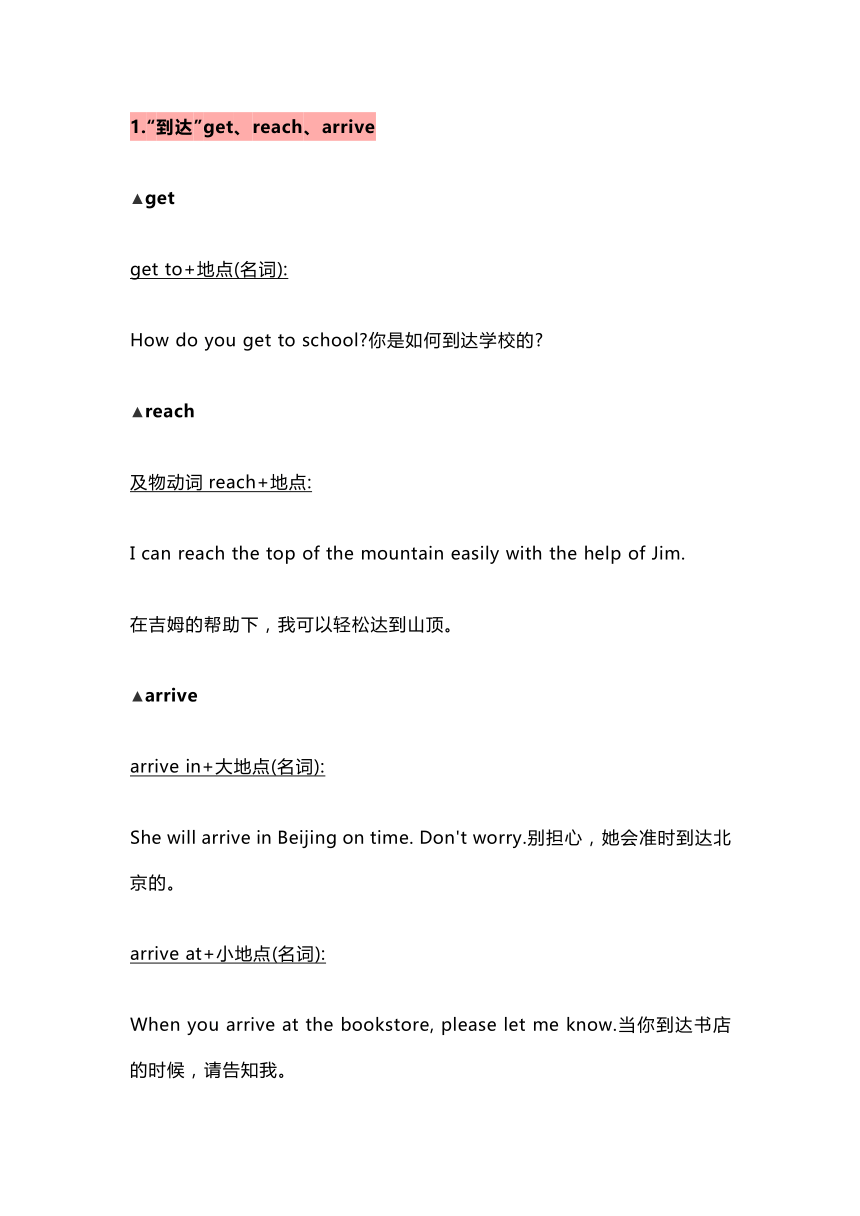
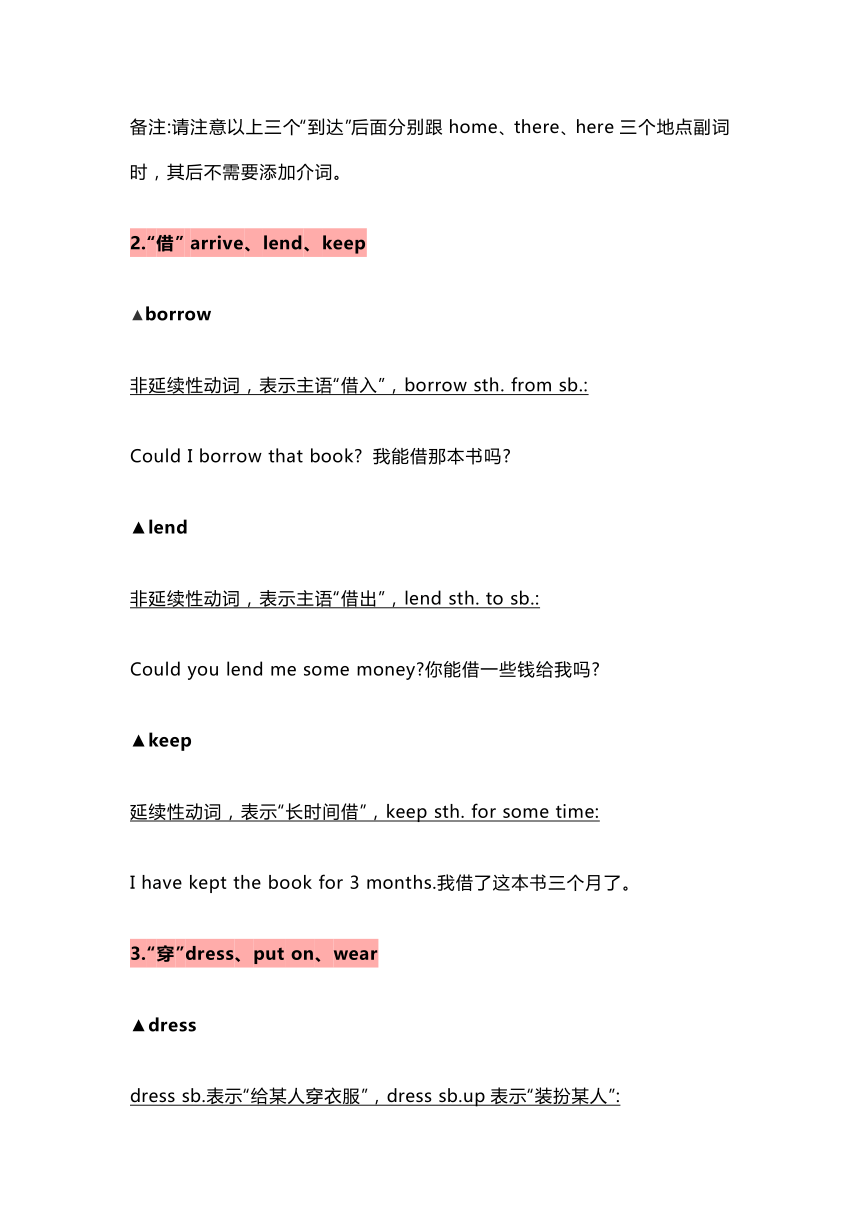
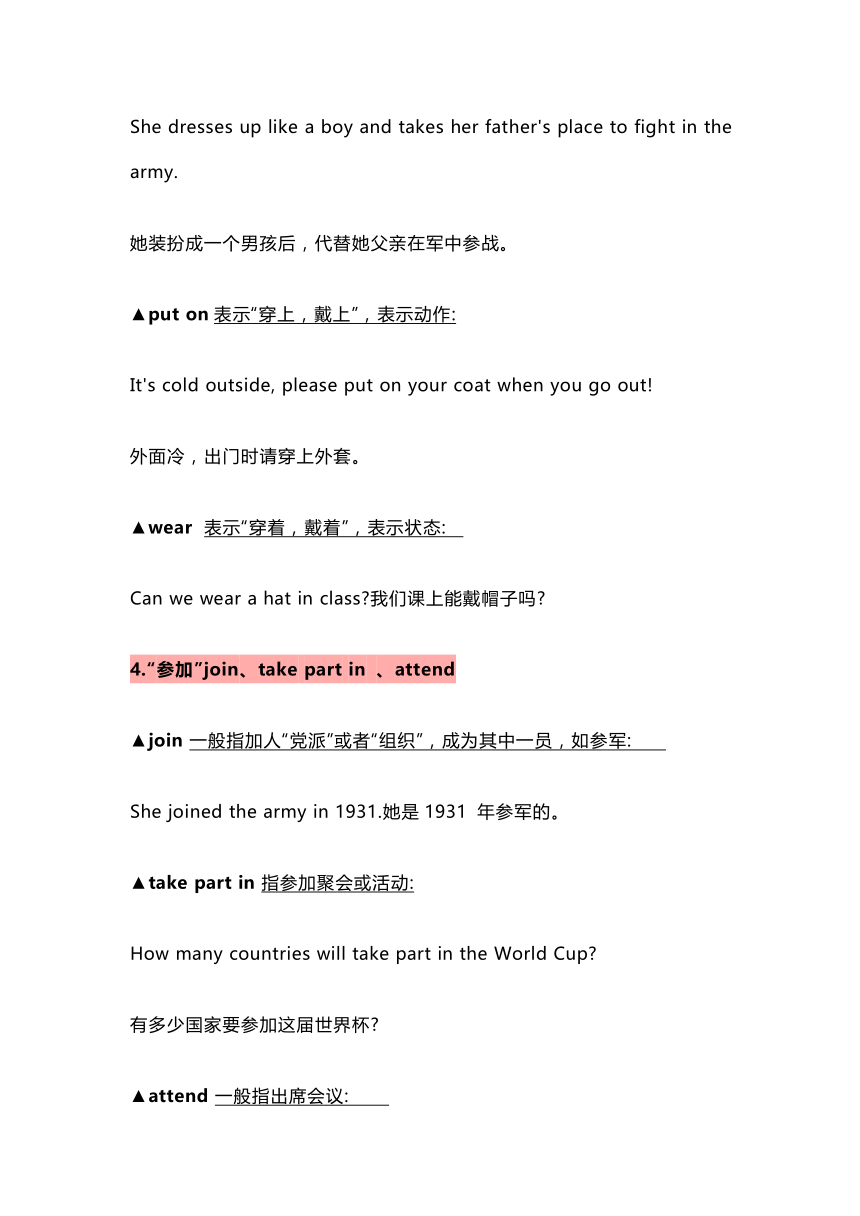
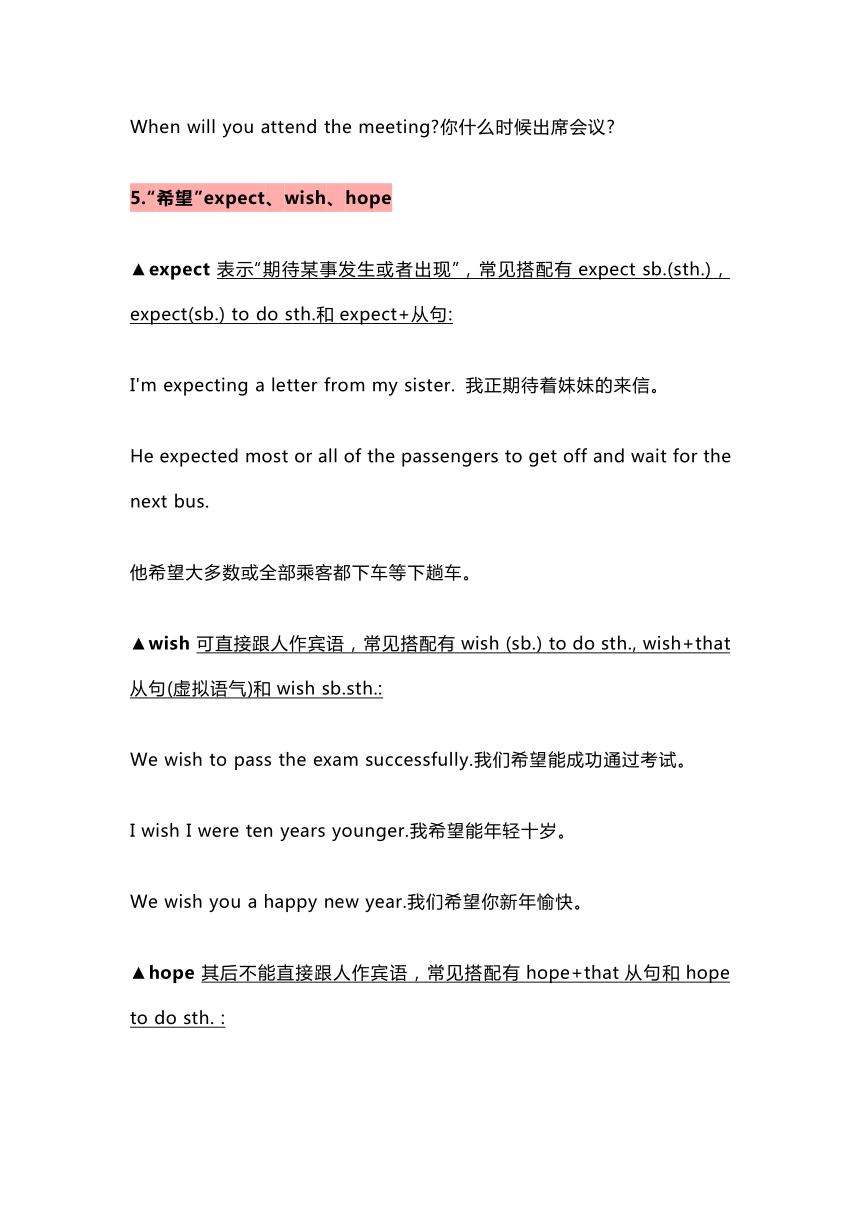
文档简介
动词及动词短语辨析
中考英语试题考查的重点之一-----动词。其词义及用法辨析是单项选择、完形填空及完成句子等题型考查的重点。
在辨析词义和用法时,动词短语又占有相当大的比重,短语选项的设计有以下几种类型:
同一动词+不同名词
同一动词+不同副词(或介词)
不同动词+同一副词(或介词)
不同动词+不同副词
因此,我们在日常学习中要重视动词短语,特别是对易混淆的动词短语的积累及分类整理。
[考点一]动词词义及用法辨析
动词词义及用法辨析主要考察的是含义相近但用法不同的动词用法辨析,解题时要先根据具体的语境进行辨析,然后弄清楚每个动词具体的含义,特别是一词多义现象和用法区别,最终选择出最符合题意的选项。
初中常见的动词词义及用法辨析如下:
1.“到达”get、reach、arrive
▲get
get to+地点(名词):
How do you get to school 你是如何到达学校的
▲reach
及物动词reach+地点:
I can reach the top of the mountain easily with the help of Jim.
在吉姆的帮助下,我可以轻松达到山顶。
▲arrive
arrive in+大地点(名词):
She will arrive in Beijing on time. Don't worry.别担心,她会准时到达北京的。
arrive at+小地点(名词):
When you arrive at the bookstore, please let me know.当你到达书店的时候,请告知我。
备注:请注意以上三个“到达”后面分别跟home、there、here三个地点副词时,其后不需要添加介词。
2.“借” arrive、lend、keep
▲borrow
非延续性动词,表示主语“借入”,borrow sth. from sb.:
Could I borrow that book 我能借那本书吗
▲lend
非延续性动词,表示主语“借出”,lend sth. to sb.:
Could you lend me some money 你能借一些钱给我吗
▲keep
延续性动词,表示“长时间借”,keep sth. for some time:
I have kept the book for 3 months.我借了这本书三个月了。
3.“穿”dress、put on、wear
▲dress
dress sb.表示“给某人穿衣服”,dress sb.up表示“装扮某人”:
She dresses up like a boy and takes her father's place to fight in the army.
她装扮成一个男孩后,代替她父亲在军中参战。
▲put on表示“穿上,戴上”,表示动作:
It's cold outside, please put on your coat when you go out!
外面冷,出门时请穿上外套。
▲wear 表示“穿着,戴着”,表示状态:
Can we wear a hat in class 我们课上能戴帽子吗
4.“参加”join、take part in 、attend
▲join 一般指加人“党派”或者“组织”,成为其中一员,如参军:
She joined the army in 1931.她是1931 年参军的。
▲take part in 指参加聚会或活动:
How many countries will take part in the World Cup
有多少国家要参加这届世界杯
▲attend 一般指出席会议:
When will you attend the meeting 你什么时候出席会议
5.“希望”expect、wish、hope
▲expect 表示“期待某事发生或者出现”,常见搭配有expect sb.(sth.),expect(sb.) to do sth.和expect+从句:
I'm expecting a letter from my sister. 我正期待着妹妹的来信。
He expected most or all of the passengers to get off and wait for the next bus.
他希望大多数或全部乘客都下车等下趟车。
▲wish 可直接跟人作宾语,常见搭配有wish (sb.) to do sth., wish+that从句(虚拟语气)和wish sb.sth.:
We wish to pass the exam successfully.我们希望能成功通过考试。
I wish I were ten years younger.我希望能年轻十岁。
We wish you a happy new year.我们希望你新年愉快。
▲hope 其后不能直接跟人作宾语,常见搭配有hope+that从句和hope to do sth. :
Nancy hopes to make her dream come true.南希希望能够实现她的梦想。
Nancy hopes that she can achieve her dream as quickly as possible.南希希望她能尽快实现自己的梦想。
6.“看”see、look、watch、read
▲see “看见”,表示结果:
Let's see the lions first.我们先去看狮子吧。
▲look “看”,表示动作,不及物动词,后面一般要跟介词才能接宾语:
Please look at the blackboard carefully.请仔细看黑板。
▲watch “观看(比赛、电视)”:
His dad and uncle are watching the boat races on TV.他爸爸和叔叔正在电视上观看龙舟比赛。
▲read “看(书、报)”,表示阅读:
I must read a book before I can watch TV.
看电视之前我必须先读书。
7.“拿”bring、take、carry、fetch
▲bring “带来,拿来”,表示“拿到靠近说话人的地方”:
Can we bring music players to school 我们能把音乐播放器带到学校来吗
▲take “拿去,带走”,表示“拿到远离说话人的地方”:
Please take the dog for a walk after eating,Jack!
杰克,饭后请把小狗带出去散步!
▲carry “提,拿,搬”,多指用力移动,没有方向:
I can't carry the bag alone, it's too heavy, 我自己拿不了这个包,它太重了。
▲fetch “去取,去拿”,表示“往返拿东西”
She fetched a bowl from the kitchen.她从厨房取了一个碗过来。
8.“说”speak、say、talk 、tell
▲speak 作及物动词时,后面常接表示语言的名词:
Wu Jun can speak English.吴军会讲英语。
▲say 常跟直接引语或间接引语,表示说话的内容:
What did you say just now, Lily 你刚刚说什么,莉莉
▲talk 不及物动词,常跟介词to/with,意为“同(某人)谈话”,也表示具有说话的能力:
He is talking on the phone to his cousin in Shenzhen.
他正在跟远在深圳的表兄打电话。
▲tell 意为“告诉”,常用于短语tell sb.sth.和 tell sth. to sb. 中:
They can tell you stories, and you can make friends.
他们会给你讲故事,你还可以交到朋友。
9.“花费”spend、take、cost、pay
▲spend 人作主语,表示花费时间或者金钱,后接on sth.或(in) doing sth.:
I spent half an hour (in) walking to school yesterday.我昨天花了半个小时走到学校。
▲take 可用于固定句型表示花费一段时间做某事,其结构为it takes/took sb. some time to do sth.!
How long does it take you to get to school 你到学校要花多长时间
▲cost 物作主语,表示“某物花费某人多少钱”,常用于sth. cost (s) sb. some money中:
The book cost me ten yuan.这本书花了我十块钱。
▲pay 人作主语,多与介词for 连用,sb. pay some money for sth.:
I paid ten yuan for the book. 我付了十块钱买这本书。
10.“输赢”lose、fail、beat、win
▲lose 意为“输”,常用搭配为lose to sb.:
AC Milan lost the Italian Cup final.
AC米兰队输掉了意大利杯决赛。
▲fail 意为“失败”或“未做成某事”,常见搭配为fail sth.和 fail to do sth.:
He even failed the examination.他甚至考试不及格。
▲beat 意为“打败”,后接人或者某支队伍:
We beat the strongest team in the football match this time.
在这次足球比赛中我们打败了最强的那支球队。
▲win 意为“赢得”,后接sth.,如赢得比赛、荣誉、地位等:
She won gold for China in the Olympic Games.
她在奥林匹克运动会上为中国赢得了金牌。
11.“变化”turn、become、grow
▲turn 一般用于颜色的变化:
You must stop when the lights turn red.灯变红时,你必须停下。
get天变黑、变长或者变短;天气变冷、变热等:
It's getting darker and darker. You'd better go home earlier.
天越来越暗了,你最好早点回家。
▲become 天气变暖或者变冷等,表示渐变:
It's becoming colder and colder in winter.冬天天气越变越冷。
▲grow 形状变大或者变小:
As he blows the balloon, it grows bigger and bigger.随着他不断地吹,气球越变越大。
12.“听”listen to、hear
▲listen to
listen是不及物动词,与to组成固定搭配,强调听的动作:
You must listen to your teacher carefully in class.
上课时你必须认真听老师讲课。
▲hear 及物动词,hear sth.强调听的结果:
I always hear Lily singing next door.我常常听到莉莉在隔壁唱歌。
13.“找”look for 、find
▲look for 强调找的过程、动作
I have been looking for my lost key for the whole morning.
我整个上午都在找我丢失的钥匙。
▲find 强调找的结果;
I lost my school ID card. I must find it.我把学生证弄丢了,我必须找到它。
14.“忘记”forget、leave
▲forget 强调脑海中无印象,forget to do/doing 意为“忘记要去做/做过了”。表示遗忘时,其后不接地点:
I am sorry. I've forgotten your name.不好意思,我忘记了你的名字。
▲leave 表示遗留某物在某地,其后接地点,leave sth.at/in+地点:
Don't leave the dirty dishes in the kitchen.不要把脏盘子放在厨房里。
15.“收到”accept、receive
▲accept 强调主观接受:
Will you accept my apology, Nancy 南希,你会接受我的歉意吗
▲receive 强调客观收到:
I received a wedding invitation yesterday.我昨天收到了一份结婚请帖。
16.“提供”provide 、offer
▲provide 常用搭配是provide sth.for sb.或者provide sb.with sth.:
They provided us with all the books we need.
他们为我们提供所需要的全部书籍。
▲offer 可带双宾语,常用搭配为offer sb.sth.或者offer sth. to sb.:
She offered me a cup of tea.她給我端了一杯茶。
17.“used” used to、be/get used to、be used to
▲used to 意为“过去做某事(现在不这样了)”,常用搭配为used to do sth.:
He used to be thin, but look, how big and strong he is now!
他过去很瘦,可是你看,他现在多么强壮!
▲be/get used to 意为“习惯做某事”,同义短语为become used to (doing sth.):
He used to live in the countryside, but now he is used to living in the city.
他曾经住在乡村,但现在他习惯于住在城市。
▲be used to 意为“被用来做某事”,同义短语为be used for doing sth.:
These wood is used to make/for making tables and chairs for the children.
这些木材被用来给孩子们制作桌椅。
[考点二]动词短语的辨析
初中阶段的动词短语不仅数量多,而且易混淆,平时同学们需要注意多积累,并且对相似短语进行归类和对比,这样才能在具体语境中灵活运用。
1.常见动词短语的构成
①动词+介词
smile at 冲(某人)笑,wait for等候
②动词+副词
cheer up 使兴奋,break down 损坏,分解,瓦解
③动词+名词
take effect 生效,起作用 take care 注意,当心,
④动词+名词+介词
pay attention to 关注 make a difference to 对......有影响(或作用)
⑤动词+副词+介词
bring back to 使恢复,使回想出 add up to 加起来的总和是:(总起来看,说明,意味着)
2.初中常见的动词短语
1).look
(1) look at 看...
Now let's look at another facet of the problem.(现在咱们看问题的另一面。)
(2) look like 看起来像
Monkeys look like men.(猴子看起来像人类。)
(3) look for 寻找
Do you look for a secret (你在寻找秘密?)
(4)look through 浏览
Peter starts looking through the mail as soon as the door shuts.彼得一关上门就开始逐一查看起邮件来。
(5) look up 查阅;向上看
I looked your address up in the personnel file .我在人事档案里找到了你的地址。
(6) look out 向外看;小心
Look out! he shrieked.(“小心!”他尖叫道。)
(7)look over 仔细检查
He didn't dare look over the edge.(他不敢从边缘向下看。)
(8) look forward to期盼,期待
They both look forward to it all week.(他们整整一周都期待着这个。)
(9) look after照顾,照料
Who will look after me (谁来照顾我?)
(10) look up to 崇敬,敬仰
I look up to the policeman who saved my life many years ago.
(我崇敬那位多年前救过我性命的警察。)
2).put
(1) put up举起,挂起,搭建
I helped him put up some shelves in his bedroom.(我帮他在卧室里装了几个搁架。)
(2) put on 穿上,戴上;上演;增加体重
I'm lucky really as I never put on weight.(我真的很幸运,体重从未增加过)
(3) put off 推迟,推延
Don't put off your happiness。(不要让幸福和快乐延期)
(4) put down把……放下;记下
Put down your hand and sit down.(放下你的手并坐下)
(5) put out 扑灭;伸出
The firemen quickly put out the fire.(消防队员很快就将火势扑灭了。)
(6) put away收拾,整理
He needed some extra money put away for that.(他还需要存一些额外的钱以备不时之需。)
3).get
(1) get up 起床
When do you usually get up in the morning 你早上通常几点起床
(2) get on/off上/下车
You must watch out when you get on/off the bus.上(下)车时你必须小心。
(3) get over 克服;恢复;原谅
You can be successful if you try to get over all the difficulties.
如果你尽力克服所有的困难,那么你就会成功。
(4) get along/on well with进展,相处融洽
I believe that you can get on well with all the students in the class.
我相信你能和班上的所有同学友好相处。
(5) get ready for为……做准备
I'm afraid I can't go with you because I must study hard and get ready for my English test tomorrow.
恐怕我不能跟您去,因为我必须努力学习为明天的英语考试做准备。
(6) get married 结婚
My parents got married fifty years ago and now they are still living happily.我的父母五十年前结婚,现在他们仍然过着幸福的生活。
(7) get to 到达
How do you get to school every day 一By bus.
你每天如何去学校 坐公交车。
(8) get into (trouble) 陷入困境中
Whenever you get into trouble, please call me.无论何时你陷入困境,请給我打电话。
(9) get in the way 妨碍
Do you think doing part-time jobs can get in the way of my study
你认为做兼职会妨碍我的学习吗
4).give
(1) give up放弃
Aron did not give up after the accident and keeps on climbing mountains today.
事故后阿伦没有放弃,一直到今天都还坚持爬山。
(2)give out 分发
The students always help the teacher give out all the exercise books.学生们经常帮老师发作业本。
(3) give away 赠送,分发
It's helpful to give away the books to children in the poor areas.
把书本赠送给贫困地区的孩子是有益处的。
(4)give back 归还
When you finish reading the book, please remember to give it back to the library.
当你读完这本书后,请记得把它归还给图书馆。
5).take
(1)take up占据(时间、空间等);开始从事
He takes up his career by selling newpaper.他的事业开始于卖报纸。
(2) take after 与(父母等)相像
His big eyes and curly hair take after his mother.他的大眼睛和卷发遗传自他的母亲。
(3) take place 发生
We were all surprised at the great changes that have taken place in the city recently.我们都被这座城市最近发生的巨大改变震惊了。
(4) take off 脱下;起飞
The plane takes off at 0:30 every night.这架飞机每晚零点半起飞。
(5) take out 拿走,拿出去
Therefore, many Chinese people like takeout food.(所以很多中国人都喜欢外卖食品)。
(6) take care of 照顾,照料
I will take care of him till the end.(我会一直照顾他到最后。)
(7) take/have a rest 休息一下
I need to take/have a rest after ten hours' work.工作了十小时后我需要休息一下。
(8) take a shower洗澡
She was too tired to take a shower.(她累得不想淋浴了。)
(9) take part in 参加
Can I take part in (我可以参与吗?)
(10) take pride in对……感到自豪
Bill take great pride in his work. Bill对他的工作感到自豪。
(11) take the place of 代替
She dresses up like a boy and takes her father's place to fight in the army.
她打扮成一个男孩,然后代替地父亲在军中参战。
6).turn
(1) turn on打开
Please turn on the electric fan to air the room.(请打开电风扇让房间通风。)
(2) turn off 关闭
Did you turn off the lights and check the locks on all the doors (你关了灯,检查了所有门的锁了吗?)
(3)turn up调大,放大
Bill likes to turn up the TV.(比尔喜欢把电视声音开大。)
(4) turn down 调小,关小;拒绝
Please ask Mary to turn downthe radio。 请让玛丽把收音机的音量调小一点。
(5) turn lef/right向左转/向右转
Tum right at the first crossing and the restaurant is on your left, across from the pay phone.
在第一个十字路口向右转,然后左手边就是餐馆,付费电话对面。
7).make
(1) make up编造,杜撰;构成,组成
The boy made up a story; it was not true.
男孩编了个故事,这故事不是真的。
(2) make a decision 做决定
We'll have to make a decision. 我们不得不做一个决定。
(3) make progress取得进步
She makes greater progress this term than she did last term.她这学期比上学期的进步大。
(4) make it约定;成功;及时赶到
I'm sorry. I cant make it tomorrow.(很抱歉。我明天不行。)
(5) make sure 务必,确保
I make sure I am going to faint.我确信我要晕倒了。
(6) make sb. feel at home 使某人感到宾至如归
The warm atmosphere make the customers feel at home.这种消没温馨的气氛让顾客宾至如归
e
(1) come from 来自
The letter had come from an unknown mischief-maker.(这封信来自一个匿名的离间者。)
(2) come out出版;升起;花开
When does her new book come out (她的新书什么时候出版?)
(3) come up with 想出,提出
Subsequent studies have come up with similar results.(随后的研究也得出了类似的结果。)
(4) come true 实现
Getting into beijing university is my dream come true. 去北京大学读书让我的梦想成真。
(5) come over 顺便来访
Would you like to come over (你想过来吗?)
中考英语试题考查的重点之一-----动词。其词义及用法辨析是单项选择、完形填空及完成句子等题型考查的重点。
在辨析词义和用法时,动词短语又占有相当大的比重,短语选项的设计有以下几种类型:
同一动词+不同名词
同一动词+不同副词(或介词)
不同动词+同一副词(或介词)
不同动词+不同副词
因此,我们在日常学习中要重视动词短语,特别是对易混淆的动词短语的积累及分类整理。
[考点一]动词词义及用法辨析
动词词义及用法辨析主要考察的是含义相近但用法不同的动词用法辨析,解题时要先根据具体的语境进行辨析,然后弄清楚每个动词具体的含义,特别是一词多义现象和用法区别,最终选择出最符合题意的选项。
初中常见的动词词义及用法辨析如下:
1.“到达”get、reach、arrive
▲get
get to+地点(名词):
How do you get to school 你是如何到达学校的
▲reach
及物动词reach+地点:
I can reach the top of the mountain easily with the help of Jim.
在吉姆的帮助下,我可以轻松达到山顶。
▲arrive
arrive in+大地点(名词):
She will arrive in Beijing on time. Don't worry.别担心,她会准时到达北京的。
arrive at+小地点(名词):
When you arrive at the bookstore, please let me know.当你到达书店的时候,请告知我。
备注:请注意以上三个“到达”后面分别跟home、there、here三个地点副词时,其后不需要添加介词。
2.“借” arrive、lend、keep
▲borrow
非延续性动词,表示主语“借入”,borrow sth. from sb.:
Could I borrow that book 我能借那本书吗
▲lend
非延续性动词,表示主语“借出”,lend sth. to sb.:
Could you lend me some money 你能借一些钱给我吗
▲keep
延续性动词,表示“长时间借”,keep sth. for some time:
I have kept the book for 3 months.我借了这本书三个月了。
3.“穿”dress、put on、wear
▲dress
dress sb.表示“给某人穿衣服”,dress sb.up表示“装扮某人”:
She dresses up like a boy and takes her father's place to fight in the army.
她装扮成一个男孩后,代替她父亲在军中参战。
▲put on表示“穿上,戴上”,表示动作:
It's cold outside, please put on your coat when you go out!
外面冷,出门时请穿上外套。
▲wear 表示“穿着,戴着”,表示状态:
Can we wear a hat in class 我们课上能戴帽子吗
4.“参加”join、take part in 、attend
▲join 一般指加人“党派”或者“组织”,成为其中一员,如参军:
She joined the army in 1931.她是1931 年参军的。
▲take part in 指参加聚会或活动:
How many countries will take part in the World Cup
有多少国家要参加这届世界杯
▲attend 一般指出席会议:
When will you attend the meeting 你什么时候出席会议
5.“希望”expect、wish、hope
▲expect 表示“期待某事发生或者出现”,常见搭配有expect sb.(sth.),expect(sb.) to do sth.和expect+从句:
I'm expecting a letter from my sister. 我正期待着妹妹的来信。
He expected most or all of the passengers to get off and wait for the next bus.
他希望大多数或全部乘客都下车等下趟车。
▲wish 可直接跟人作宾语,常见搭配有wish (sb.) to do sth., wish+that从句(虚拟语气)和wish sb.sth.:
We wish to pass the exam successfully.我们希望能成功通过考试。
I wish I were ten years younger.我希望能年轻十岁。
We wish you a happy new year.我们希望你新年愉快。
▲hope 其后不能直接跟人作宾语,常见搭配有hope+that从句和hope to do sth. :
Nancy hopes to make her dream come true.南希希望能够实现她的梦想。
Nancy hopes that she can achieve her dream as quickly as possible.南希希望她能尽快实现自己的梦想。
6.“看”see、look、watch、read
▲see “看见”,表示结果:
Let's see the lions first.我们先去看狮子吧。
▲look “看”,表示动作,不及物动词,后面一般要跟介词才能接宾语:
Please look at the blackboard carefully.请仔细看黑板。
▲watch “观看(比赛、电视)”:
His dad and uncle are watching the boat races on TV.他爸爸和叔叔正在电视上观看龙舟比赛。
▲read “看(书、报)”,表示阅读:
I must read a book before I can watch TV.
看电视之前我必须先读书。
7.“拿”bring、take、carry、fetch
▲bring “带来,拿来”,表示“拿到靠近说话人的地方”:
Can we bring music players to school 我们能把音乐播放器带到学校来吗
▲take “拿去,带走”,表示“拿到远离说话人的地方”:
Please take the dog for a walk after eating,Jack!
杰克,饭后请把小狗带出去散步!
▲carry “提,拿,搬”,多指用力移动,没有方向:
I can't carry the bag alone, it's too heavy, 我自己拿不了这个包,它太重了。
▲fetch “去取,去拿”,表示“往返拿东西”
She fetched a bowl from the kitchen.她从厨房取了一个碗过来。
8.“说”speak、say、talk 、tell
▲speak 作及物动词时,后面常接表示语言的名词:
Wu Jun can speak English.吴军会讲英语。
▲say 常跟直接引语或间接引语,表示说话的内容:
What did you say just now, Lily 你刚刚说什么,莉莉
▲talk 不及物动词,常跟介词to/with,意为“同(某人)谈话”,也表示具有说话的能力:
He is talking on the phone to his cousin in Shenzhen.
他正在跟远在深圳的表兄打电话。
▲tell 意为“告诉”,常用于短语tell sb.sth.和 tell sth. to sb. 中:
They can tell you stories, and you can make friends.
他们会给你讲故事,你还可以交到朋友。
9.“花费”spend、take、cost、pay
▲spend 人作主语,表示花费时间或者金钱,后接on sth.或(in) doing sth.:
I spent half an hour (in) walking to school yesterday.我昨天花了半个小时走到学校。
▲take 可用于固定句型表示花费一段时间做某事,其结构为it takes/took sb. some time to do sth.!
How long does it take you to get to school 你到学校要花多长时间
▲cost 物作主语,表示“某物花费某人多少钱”,常用于sth. cost (s) sb. some money中:
The book cost me ten yuan.这本书花了我十块钱。
▲pay 人作主语,多与介词for 连用,sb. pay some money for sth.:
I paid ten yuan for the book. 我付了十块钱买这本书。
10.“输赢”lose、fail、beat、win
▲lose 意为“输”,常用搭配为lose to sb.:
AC Milan lost the Italian Cup final.
AC米兰队输掉了意大利杯决赛。
▲fail 意为“失败”或“未做成某事”,常见搭配为fail sth.和 fail to do sth.:
He even failed the examination.他甚至考试不及格。
▲beat 意为“打败”,后接人或者某支队伍:
We beat the strongest team in the football match this time.
在这次足球比赛中我们打败了最强的那支球队。
▲win 意为“赢得”,后接sth.,如赢得比赛、荣誉、地位等:
She won gold for China in the Olympic Games.
她在奥林匹克运动会上为中国赢得了金牌。
11.“变化”turn、become、grow
▲turn 一般用于颜色的变化:
You must stop when the lights turn red.灯变红时,你必须停下。
get天变黑、变长或者变短;天气变冷、变热等:
It's getting darker and darker. You'd better go home earlier.
天越来越暗了,你最好早点回家。
▲become 天气变暖或者变冷等,表示渐变:
It's becoming colder and colder in winter.冬天天气越变越冷。
▲grow 形状变大或者变小:
As he blows the balloon, it grows bigger and bigger.随着他不断地吹,气球越变越大。
12.“听”listen to、hear
▲listen to
listen是不及物动词,与to组成固定搭配,强调听的动作:
You must listen to your teacher carefully in class.
上课时你必须认真听老师讲课。
▲hear 及物动词,hear sth.强调听的结果:
I always hear Lily singing next door.我常常听到莉莉在隔壁唱歌。
13.“找”look for 、find
▲look for 强调找的过程、动作
I have been looking for my lost key for the whole morning.
我整个上午都在找我丢失的钥匙。
▲find 强调找的结果;
I lost my school ID card. I must find it.我把学生证弄丢了,我必须找到它。
14.“忘记”forget、leave
▲forget 强调脑海中无印象,forget to do/doing 意为“忘记要去做/做过了”。表示遗忘时,其后不接地点:
I am sorry. I've forgotten your name.不好意思,我忘记了你的名字。
▲leave 表示遗留某物在某地,其后接地点,leave sth.at/in+地点:
Don't leave the dirty dishes in the kitchen.不要把脏盘子放在厨房里。
15.“收到”accept、receive
▲accept 强调主观接受:
Will you accept my apology, Nancy 南希,你会接受我的歉意吗
▲receive 强调客观收到:
I received a wedding invitation yesterday.我昨天收到了一份结婚请帖。
16.“提供”provide 、offer
▲provide 常用搭配是provide sth.for sb.或者provide sb.with sth.:
They provided us with all the books we need.
他们为我们提供所需要的全部书籍。
▲offer 可带双宾语,常用搭配为offer sb.sth.或者offer sth. to sb.:
She offered me a cup of tea.她給我端了一杯茶。
17.“used” used to、be/get used to、be used to
▲used to 意为“过去做某事(现在不这样了)”,常用搭配为used to do sth.:
He used to be thin, but look, how big and strong he is now!
他过去很瘦,可是你看,他现在多么强壮!
▲be/get used to 意为“习惯做某事”,同义短语为become used to (doing sth.):
He used to live in the countryside, but now he is used to living in the city.
他曾经住在乡村,但现在他习惯于住在城市。
▲be used to 意为“被用来做某事”,同义短语为be used for doing sth.:
These wood is used to make/for making tables and chairs for the children.
这些木材被用来给孩子们制作桌椅。
[考点二]动词短语的辨析
初中阶段的动词短语不仅数量多,而且易混淆,平时同学们需要注意多积累,并且对相似短语进行归类和对比,这样才能在具体语境中灵活运用。
1.常见动词短语的构成
①动词+介词
smile at 冲(某人)笑,wait for等候
②动词+副词
cheer up 使兴奋,break down 损坏,分解,瓦解
③动词+名词
take effect 生效,起作用 take care 注意,当心,
④动词+名词+介词
pay attention to 关注 make a difference to 对......有影响(或作用)
⑤动词+副词+介词
bring back to 使恢复,使回想出 add up to 加起来的总和是:(总起来看,说明,意味着)
2.初中常见的动词短语
1).look
(1) look at 看...
Now let's look at another facet of the problem.(现在咱们看问题的另一面。)
(2) look like 看起来像
Monkeys look like men.(猴子看起来像人类。)
(3) look for 寻找
Do you look for a secret (你在寻找秘密?)
(4)look through 浏览
Peter starts looking through the mail as soon as the door shuts.彼得一关上门就开始逐一查看起邮件来。
(5) look up 查阅;向上看
I looked your address up in the personnel file .我在人事档案里找到了你的地址。
(6) look out 向外看;小心
Look out! he shrieked.(“小心!”他尖叫道。)
(7)look over 仔细检查
He didn't dare look over the edge.(他不敢从边缘向下看。)
(8) look forward to期盼,期待
They both look forward to it all week.(他们整整一周都期待着这个。)
(9) look after照顾,照料
Who will look after me (谁来照顾我?)
(10) look up to 崇敬,敬仰
I look up to the policeman who saved my life many years ago.
(我崇敬那位多年前救过我性命的警察。)
2).put
(1) put up举起,挂起,搭建
I helped him put up some shelves in his bedroom.(我帮他在卧室里装了几个搁架。)
(2) put on 穿上,戴上;上演;增加体重
I'm lucky really as I never put on weight.(我真的很幸运,体重从未增加过)
(3) put off 推迟,推延
Don't put off your happiness。(不要让幸福和快乐延期)
(4) put down把……放下;记下
Put down your hand and sit down.(放下你的手并坐下)
(5) put out 扑灭;伸出
The firemen quickly put out the fire.(消防队员很快就将火势扑灭了。)
(6) put away收拾,整理
He needed some extra money put away for that.(他还需要存一些额外的钱以备不时之需。)
3).get
(1) get up 起床
When do you usually get up in the morning 你早上通常几点起床
(2) get on/off上/下车
You must watch out when you get on/off the bus.上(下)车时你必须小心。
(3) get over 克服;恢复;原谅
You can be successful if you try to get over all the difficulties.
如果你尽力克服所有的困难,那么你就会成功。
(4) get along/on well with进展,相处融洽
I believe that you can get on well with all the students in the class.
我相信你能和班上的所有同学友好相处。
(5) get ready for为……做准备
I'm afraid I can't go with you because I must study hard and get ready for my English test tomorrow.
恐怕我不能跟您去,因为我必须努力学习为明天的英语考试做准备。
(6) get married 结婚
My parents got married fifty years ago and now they are still living happily.我的父母五十年前结婚,现在他们仍然过着幸福的生活。
(7) get to 到达
How do you get to school every day 一By bus.
你每天如何去学校 坐公交车。
(8) get into (trouble) 陷入困境中
Whenever you get into trouble, please call me.无论何时你陷入困境,请給我打电话。
(9) get in the way 妨碍
Do you think doing part-time jobs can get in the way of my study
你认为做兼职会妨碍我的学习吗
4).give
(1) give up放弃
Aron did not give up after the accident and keeps on climbing mountains today.
事故后阿伦没有放弃,一直到今天都还坚持爬山。
(2)give out 分发
The students always help the teacher give out all the exercise books.学生们经常帮老师发作业本。
(3) give away 赠送,分发
It's helpful to give away the books to children in the poor areas.
把书本赠送给贫困地区的孩子是有益处的。
(4)give back 归还
When you finish reading the book, please remember to give it back to the library.
当你读完这本书后,请记得把它归还给图书馆。
5).take
(1)take up占据(时间、空间等);开始从事
He takes up his career by selling newpaper.他的事业开始于卖报纸。
(2) take after 与(父母等)相像
His big eyes and curly hair take after his mother.他的大眼睛和卷发遗传自他的母亲。
(3) take place 发生
We were all surprised at the great changes that have taken place in the city recently.我们都被这座城市最近发生的巨大改变震惊了。
(4) take off 脱下;起飞
The plane takes off at 0:30 every night.这架飞机每晚零点半起飞。
(5) take out 拿走,拿出去
Therefore, many Chinese people like takeout food.(所以很多中国人都喜欢外卖食品)。
(6) take care of 照顾,照料
I will take care of him till the end.(我会一直照顾他到最后。)
(7) take/have a rest 休息一下
I need to take/have a rest after ten hours' work.工作了十小时后我需要休息一下。
(8) take a shower洗澡
She was too tired to take a shower.(她累得不想淋浴了。)
(9) take part in 参加
Can I take part in (我可以参与吗?)
(10) take pride in对……感到自豪
Bill take great pride in his work. Bill对他的工作感到自豪。
(11) take the place of 代替
She dresses up like a boy and takes her father's place to fight in the army.
她打扮成一个男孩,然后代替地父亲在军中参战。
6).turn
(1) turn on打开
Please turn on the electric fan to air the room.(请打开电风扇让房间通风。)
(2) turn off 关闭
Did you turn off the lights and check the locks on all the doors (你关了灯,检查了所有门的锁了吗?)
(3)turn up调大,放大
Bill likes to turn up the TV.(比尔喜欢把电视声音开大。)
(4) turn down 调小,关小;拒绝
Please ask Mary to turn downthe radio。 请让玛丽把收音机的音量调小一点。
(5) turn lef/right向左转/向右转
Tum right at the first crossing and the restaurant is on your left, across from the pay phone.
在第一个十字路口向右转,然后左手边就是餐馆,付费电话对面。
7).make
(1) make up编造,杜撰;构成,组成
The boy made up a story; it was not true.
男孩编了个故事,这故事不是真的。
(2) make a decision 做决定
We'll have to make a decision. 我们不得不做一个决定。
(3) make progress取得进步
She makes greater progress this term than she did last term.她这学期比上学期的进步大。
(4) make it约定;成功;及时赶到
I'm sorry. I cant make it tomorrow.(很抱歉。我明天不行。)
(5) make sure 务必,确保
I make sure I am going to faint.我确信我要晕倒了。
(6) make sb. feel at home 使某人感到宾至如归
The warm atmosphere make the customers feel at home.这种消没温馨的气氛让顾客宾至如归
e
(1) come from 来自
The letter had come from an unknown mischief-maker.(这封信来自一个匿名的离间者。)
(2) come out出版;升起;花开
When does her new book come out (她的新书什么时候出版?)
(3) come up with 想出,提出
Subsequent studies have come up with similar results.(随后的研究也得出了类似的结果。)
(4) come true 实现
Getting into beijing university is my dream come true. 去北京大学读书让我的梦想成真。
(5) come over 顺便来访
Would you like to come over (你想过来吗?)
同课章节目录
- 词法
- 名词
- 动词和动词短语
- 动词语态
- 动词时态
- 助动词和情态动词
- 非谓语动词
- 冠词
- 代词
- 数词和量词
- 形容词副词及其比较等级
- 介词和介词短语
- 连词和感叹词
- 构词法
- 相似、相近词比较
- 句法
- 陈述句
- 一般疑问句和否定疑问句
- 特殊疑问句及选择疑问句
- 反意疑问句
- 存在句(There be句型)
- 宾语从句
- 定语从句
- 状语从句
- 主谓一致问题
- 简单句
- 并列句
- 复合句
- 主谓一致
- 主、表语从句
- 名词性从句
- 直接引语和间接引语
- 虚拟语气
- 感叹句
- 强调句
- 倒装句
- 祈使句
- 句子的成分
- 句子的分类
- 题型专区
- 单项选择部分
- 易错题
- 完形填空
- 阅读理解
- 词汇练习
- 听说训练
- 句型转换
- 补全对话
- 短文改错
- 翻译
- 书面表达
- 任务型阅读
- 语法填空
- 其他资料
